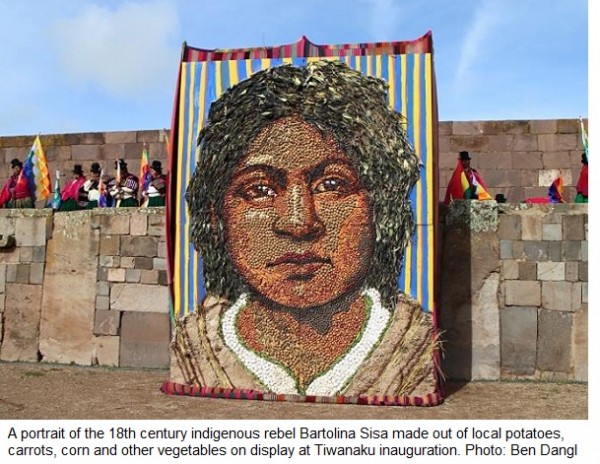Latin America
Related: About this forumThe Power of the Spectacle in Bolivia
The Power of the Spectacle in Bolivia
By Ben Dangl
January 29, 2015

A caravan of buses, security vehicles, indigenous leaders and backpackers with Che T-shirts wove their way down a muddy road through farmers’ fields last Wednesday to the pre-colonial city of Tiwanaku, where Bolivian President Evo Morales was ceremonially inaugurated into his third term in office. Folk music played throughout the morning as indigenous priests conducted complex rituals to prepare the president for his next term. The spectacle in the ancient city’s ruins was marked by its many layers of symbolic meaning.
“Today is a special day, a historic day reaffirming our identity,” Morales, the country’s first indigenous president, said in his speech in a stone doorway to Tiwanaku. “For more than 500 years we have suffered darkness, hate, racism, discrimination and individualism, ever since the strange [Spanish] men arrived who told us we had to modernize, we had to civilize ourselves… But to modernize us, to civilize us, first they had to make the indigenous peoples of the world disappear.”
Last October, Morales was re-elected with more than 60% of the vote. His popularity is largely due to his Movement Toward Socialism (MAS) party’s success in reducing poverty, empowering marginalized sectors of society, and using funds from state-run industries for hospitals, schools and much-needed public works projects across Bolivia.
“This event is very important for us, for the Aymara, Quechua and Guarani people,” said Ismael Ticona Quispe of the Tupak Katari campesino federation of La Paz. “[Evo Morales] is our brother who is in power now after more than 500 years of slavery. Therefore this ceremony has a lot of importance for us… We consider this a huge celebration, especially for the Aymaras.”
Full article: https://zcomm.org/znetarticle/the-power-of-the-spectacle-in-bolivia/
Judi Lynn
(164,067 posts)The material left behind from the remote past, before the Incas, even, is completely unique. So many people have gone there to study it and the singular place it holds in our world.
The choice of holding this ceremony there is compelling, and wonderful for the first Native Bolivian President in post-invasion, post-subjugation, post-slavery, post stolen Bolivia.
[center] 




 [/center]
[/center]
More from your article:
There were thousands of Bolivian social, indigenous and labor movement participants in attendance, yet the presence and enthusiasm of international activists, from Europe to Central America, was very palpable at Tiwanaku. Beyond the many shortcomings and victories of the Morales government nationally, the administration also serves a political purpose outside of Bolivia’s borders, orienting and inspiring people toward an alternative horizon.
As Ana Llao, a Mapuche leader from Chile, explained, she was attending the ceremony “to strengthen the ties between the indigenous peoples of Abya Yala and especially give our support to our brother Evo who is the first indigenous president. I believe that in Latin America and throughout the world, as (Morales) said so well in his speech, that today the indigenous, the original peoples, these social classes are capable of governing. Today Bolivia is demonstrating this.”
Wonderful occasion. Thank you.
Peace Patriot
(24,010 posts)Judi Lynn
(164,067 posts)Have been fascinated by this architecture, hoping archeologists and anthropologists will find some information for us all someday concerning the people who lived there long before the Inca.
Thank you!
polly7
(20,582 posts)Judi Lynn
(164,067 posts)bemildred
(90,061 posts)Judi Lynn
(164,067 posts)Couldn't vote.
Even now the fascist European-descendants call them "llama abortions," among other things.
They've had to endure the monsters with all the weapons so long.
bemildred
(90,061 posts)It borders on being a law of nature. We still deny and mistreat our own, and the world is just full of such. The Capitalist, in the same way, denies that his workers ever did anything, the thief says his victims had too much anyway.
But I am glad to see Evo, it has been a long time.
